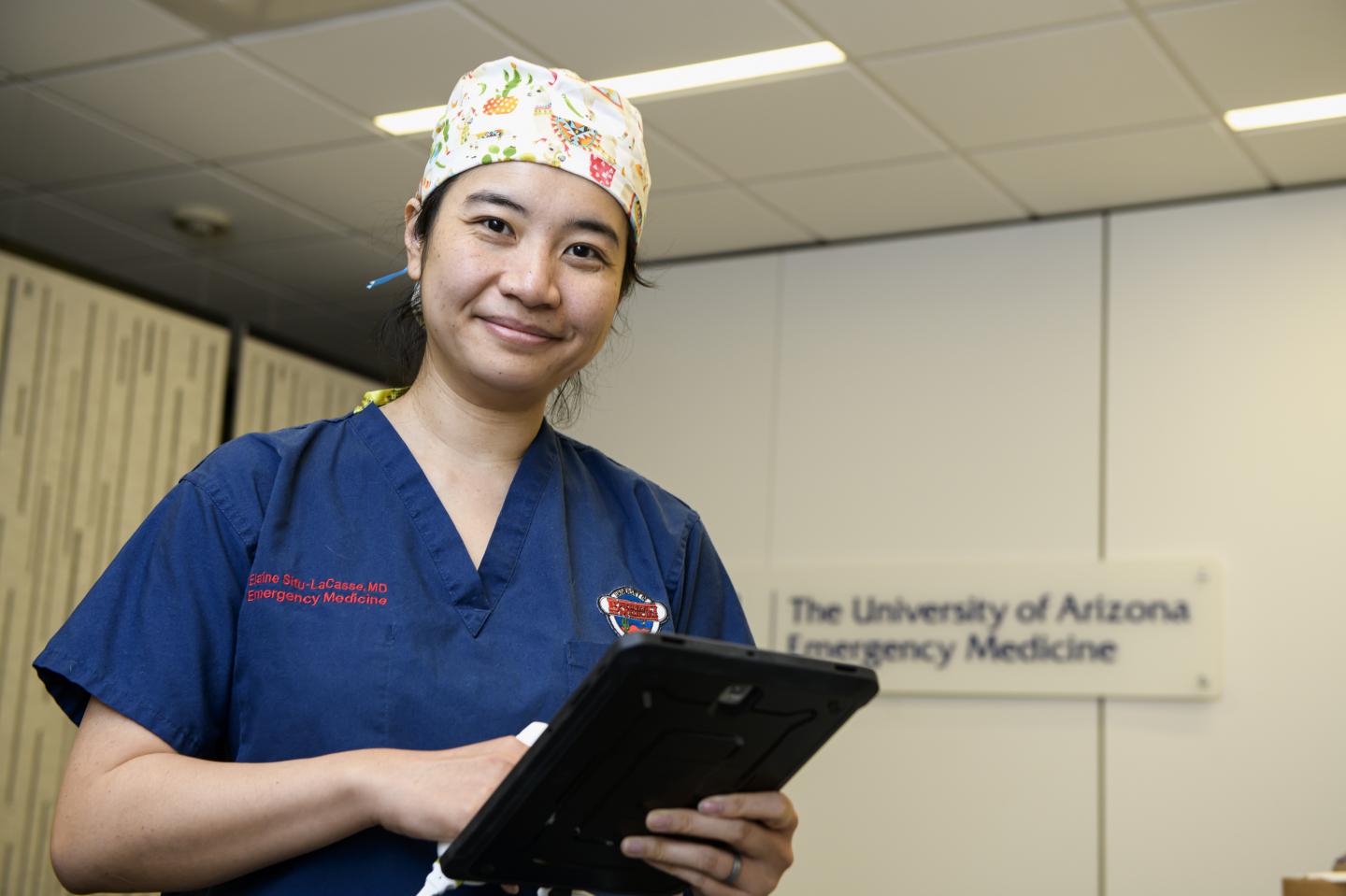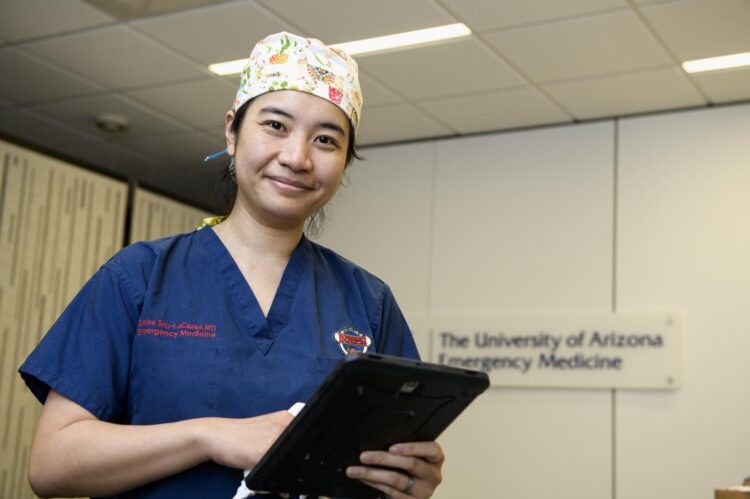The University of Arizona College of Medicine – Tucson-led tele-ultrasound training program for lung point-of-care ultrasound (POCUS) will enable rural emergency departments to more effectively identify and treat suspected COVID-19 patients

Credit: (Photo: University of Arizona Department of Health Sciences, Kris Hanning)
TUCSON, Ariz. – The University of Arizona Health Sciences is developing a lung ultrasound education program for rural emergency medicine providers to better diagnose COVID-19.
Lung ultrasound can be particularly useful in rural emergency departments (EDs), as many lack CT scan capabilities or have limited access to COVID-19 testing. With the disparate impact of COVID-19 on rural populations in Arizona, it is important to expand use of the imaging tool across the state.
Elaine Situ-LaCasse, MD, an assistant professor in the Department of Emergency Medicine at the UArizona College of Medicine – Tucson and a scholar of the National Foundation of Emergency Medicine (NFoEM), is leading the effort to develop the ultrasound education program for rural emergency medicine providers.
“The ability to perform lung ultrasound could help rural physicians with screening, management and follow-up,” Dr. Situ-LaCasse said. “This tele-ultrasound education program would allow rural EM providers to connect with POCUS experts for education, image review, consultation and quality assurance.”
One of the rural sites participating in the program is Copper Queen Community Hospital in Bisbee, Arizona.
“As a critical care hospital, we often lack staff and resources but, despite these barriers, we strive to provide quality care to rural communities,” said Julia M. Brown, MD, the hospital’s Emergency Department medical director. “Our providers are excited to partner with Dr. Situ-Lacasse using state-of-the-art ultrasound to help diagnose and treat our patients.”
Lung ultrasound (LUS) plays a critical role in the COVID-19 pandemic. Evidence is mounting regarding its effectiveness to diagnose and assess the severity of coronavirus infections in hospital EDs. Sonographic features correlate well to computed tomography (CT) chest findings and a bedside LUS scan performed by a trained clinician, along with clinical examination, could be an alternative to chest X-ray and CT chest scans in these patients.
The project, “CLUE Study: A Tele-ultrasound Pilot Study in Rural Emergency Departments,” is funded by a NFoEM research grant. Upon completion of the CLUE (COVID-19 Lung Ultrasound Education) pilot study, Dr. Situ-LaCasse plans to expand the effort to a multi-center study that would include more rural EDs in other geographic regions of the United States. She also plans to expand this tele-ultrasound education platform to community EDs and other point-of-care ultrasound (POCUS) applications, such as cardiac ultrasound.
Dr. Situ-LaCasse will investigate the knowledge gap in rural emergency medicine providers’ use of lung ultrasound. Her research team will build upon various tele-ultrasound platforms to create a sustainable, reproducible and scalable tele-ultrasound education program to help rural ED physicians feel more comfortable performing lung ultrasounds in the diagnosis and management of suspected or confirmed COVID-19 patients.
Dr. Situ-LaCasse is a part of NFoEM’s Scholar/Mentor Program, which provides an opportunity for scholars from 10 partner institutions to work on translational medicine research and foster professional development. She is one of nine scholar-mentor pairs receiving NFoEM funding for their COVID-19-related research projects. Her mentor is Srikar Adhikari, MD, a UArizona emergency medicine professor, Emergency Ultrasound Section chief and program director of the Emergency Ultrasound Fellowship.
###
Dr. Situ-LaCasse’s research team includes Dr. Adhikari; Josie Acuña, MD; Mimi Bach, MD; and Adrienne Yarnish, MD – who have completed or are in a one-year fellowship in emergency ultrasound performance, quality assurance, research and education, and have experience teaching a one-day in-person ultrasound course at the Native American and Rural Emergency Medicine Conference. They’re collaborating with Jarrod Mosier, MD, an NFoEM Scholar alumnus, UArizona emergency and internal medicine associate professor and associate program director of the college’s Critical Care Medicine Fellowship.
More information on the college’s activities regarding the COVID-19 pandemic is at this link.
The UArizona Health Sciences COVID-19 Research webpage can be found here.
For the latest on the UArizona response to the novel coronavirus, visit the COVID-19 webpage.
For UANews coverage of COVID-19, visit https:/
NOTE: Photos available here – https:/
Researcher contact:
Elaine Situ-LaCasse, MD
520-626-4239
[email protected]
Media contact:
Jo Marie Barkley
520-260-6688
[email protected]
About the University of Arizona College of Medicine – Tucson
The University of Arizona College of Medicine – Tucson is shaping the future of medicine through state-of-the-art medical education programs, groundbreaking research and advancements in patient care in Arizona and beyond. Founded in 1967, the college boasts more than 50 years of innovation, ranking among the top medical schools in the nation for research and primary care. Through the university’s partnership with Banner Health, one of the largest nonprofit health-care systems in the country, the college is leading the way in academic medicine. For more information, visit medicine.arizona.edu (Follow us: Facebook | Twitter | Instagram | LinkedIn).
About the University of Arizona Health Sciences
The University of Arizona Health Sciences is the statewide leader in biomedical research and health professions training. The UArizona Health Sciences includes the Colleges of Medicine (Tucson and Phoenix), Nursing, Pharmacy, and the Mel and Enid Zuckerman College of Public Health, with main campus locations in Tucson and the growing Phoenix Biomedical Campus in downtown Phoenix. From these vantage points, the Health Sciences reaches across the state of Arizona and the greater Southwest to provide cutting-edge health education, research and community outreach services. A major economic engine, the Health Sciences employs nearly 5,000 people, has approximately 4,000 students and 900 faculty members, and garners $200 million in research grants and contracts annually. For more information: uahs.arizona.edu (Follow us: Facebook | Twitter | YouTube | LinkedIn | Instagram).
Media Contact
Jo Marie Barkley
[email protected]
Original Source
https:/





